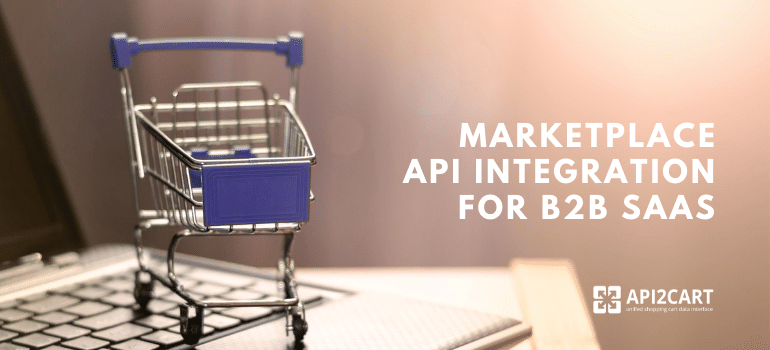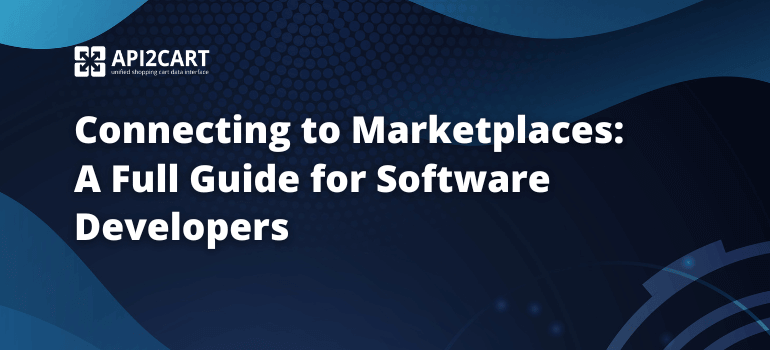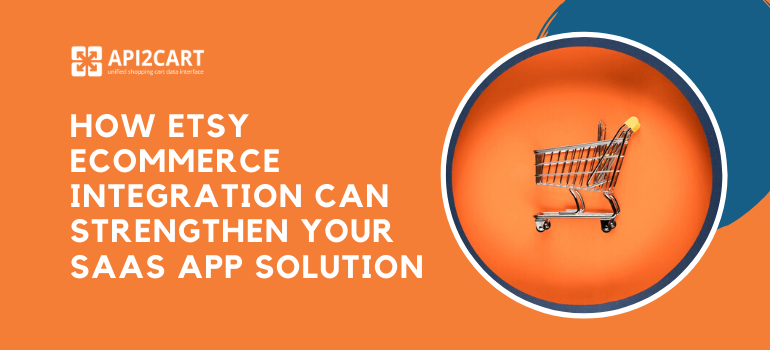
Marketplaces have taken the eCommerce industry by storm. They have changed the way people do an online business, which is not limited to just buying and selling products or services.
As per the 2019 report by Statista, online marketplaces accounted for 47% of purchases, the largest of all other mediums, including retailers’ websites, brand websites, and other digital purchase points. That said, marketplace API integration is worth exploring for SaaS companies looking to expand their customer base and make profits.
Before we go into the specifics of the importance of marketplace API integration for B2B SaaS companies, let’s get acquainted with the term.
What is Marketplace API Integration?
Integration with marketplace API is the process of establishing a seamless connection between digital marketplaces and B2B eCommerce software. While marketplaces include industry giants such as Amazon, eBay, Etsy, Shopify, etc., the B2B SaaS applications are inventory management software, warehouse management systems, shipping management solutions, order management systems, and other similar software.
Integration between marketplaces and eCommerce software helps the latter access all the data related to orders, customers, products, and categories. Such data help the software perform their core operations like managing inventory, product information, orders, creating shipments, shipping labels, updating product prices, details, and other such activities.
Without marketplace API integration, B2B SaaS application providers cannot propose their solutions to their clients. The lack of necessary data makes them function just like all other software in the market.
Top Marketplaces Your Software Needs to Integrate with
Although there are a number of online marketplaces to integrate your eCommerce software, to start with, you can choose the top 3 rank holders. For the record, Amazon and eBay are two of the most visited online marketplaces across the world.
Let’s take a detailed look into what they can offer for eCommerce software providers.
Amazon
Amazon tops the list of online marketplaces whether you consider it from the retailer's perspective or a software providers’ who are willing to integrate with marketplace platforms. Marketplace API integration with Amazon means exposure to more than 350 million online stores, as these are the number of active members on the marketplace.
Moreover, it has a dedicated audience that visits the marketplace every day for their shopping needs. After all, around 55% of all the product searches begin on Amazon. The variety of items it showcases on its platform and the number of products it sells makes it the perfect choice of many eCommerce software vendors for integration.
eBay
Founded in 1995, eBay is the second on the list after Amazon, which is worth considering for integration. Its ease of use and effectiveness makes it one of the most popular online marketplaces in the world.
You get to prospect around 19 million online sellers. Exposure to such a huge audience can do wonders for your business growth and revenue. Moreover, since it helps businesses who niche down to vintage items of handcrafted products, you can leverage the opportunity by reaching out to clients in the same industry.
Etsy
After Amazon and eBay, the most preferred marketplace for API integration is Etsy. No matter whether Etsy happens to be smaller than the former two marketplaces due to the number of online stores, it offers very promising features.
The platform counts 4,3 million active sellers, meaning you have many potential clients to pitch your software if you integrate with the marketplace. In addition, Etsy works with businesses that sell creative items in their stores. Hence, you get to deal with clients who have creative minds.

How to Develop Marketplace API Integration?
Developing a marketplace integration is tedious and involves a painstakingly complex process. That said, there are two approaches to it. They are:
In-house integration development
As the name suggests, in-house integration development involves hiring a dedicated software development team under your supervision to develop the integrations. It means you need to search for advanced developers who can code complex integrations keeping in mind the different marketplaces you are targeting.
Moreover, it involves training those developers according to your clients’ requirements, setting up the infrastructure required for the integrations, and providing the resources necessary for the job.
Not to mention, such a process entails the use of time, money, and resources with the potential to use them in other crucial business functions instead. Added to these downsides is the cost of upgrades and maintenance that is needed after developing marketplace integration. The reason being, these marketplaces keep updating their APIs for improved security and performance delivery to their customers.
Owing to such a scenario, the integrations need to comply with the latest version of marketplace APIs. Otherwise, it will result in loss of data, and the efficiency of the software also reduces.
Third-party integration development
The second and the most feasible option for marketplace API integration development is to partner with third-party service providers like API2Cart. Third-party services provide reliable integration development solutions to eCommerce software providers who are willing to incorporate advanced features in their software.
From establishing a connection between the software and the marketplace to looking after the upgrades and maintenance of integrations, third-party services keep you covered. There is no need to set up infrastructure, hire and train developers, or invest in resources for developing integrations.
In addition, marketplace integration development via third-party services is both cost-effective and time-saving. With a unified API from third-party service providers like API2Cart, you can integrate your B2B eCommerce software with 40+ eCommerce platforms and marketplaces, including Amazon, eBay, and Etsy in one go. There is no need to establish separate integrations with every platform.
Considering the fact that one integration costs about 4000 dollars and takes 4 to 8 weeks to complete, not to mention the complexity involved with every marketplace is at a different level, establishing all the integrations at once is nothing less than a blessing for software providers.
API2Cart is the leading integration platform for software vendors willing to improve their business models and the way they make profits. It also provides a 30-day free trial of its unified API to the customers.
The Takeaway
The marketplace API integration can be tricky if you go the wrong way. Given the importance of integrations and their role in uplifting your SaaS business, it is all the more essential to choose the right way of developing integrations with your eCommerce software. While in-house integration development offers close monitoring of the activities and a sense of security, third-party services are more cost-effective and reliable in the long run.



